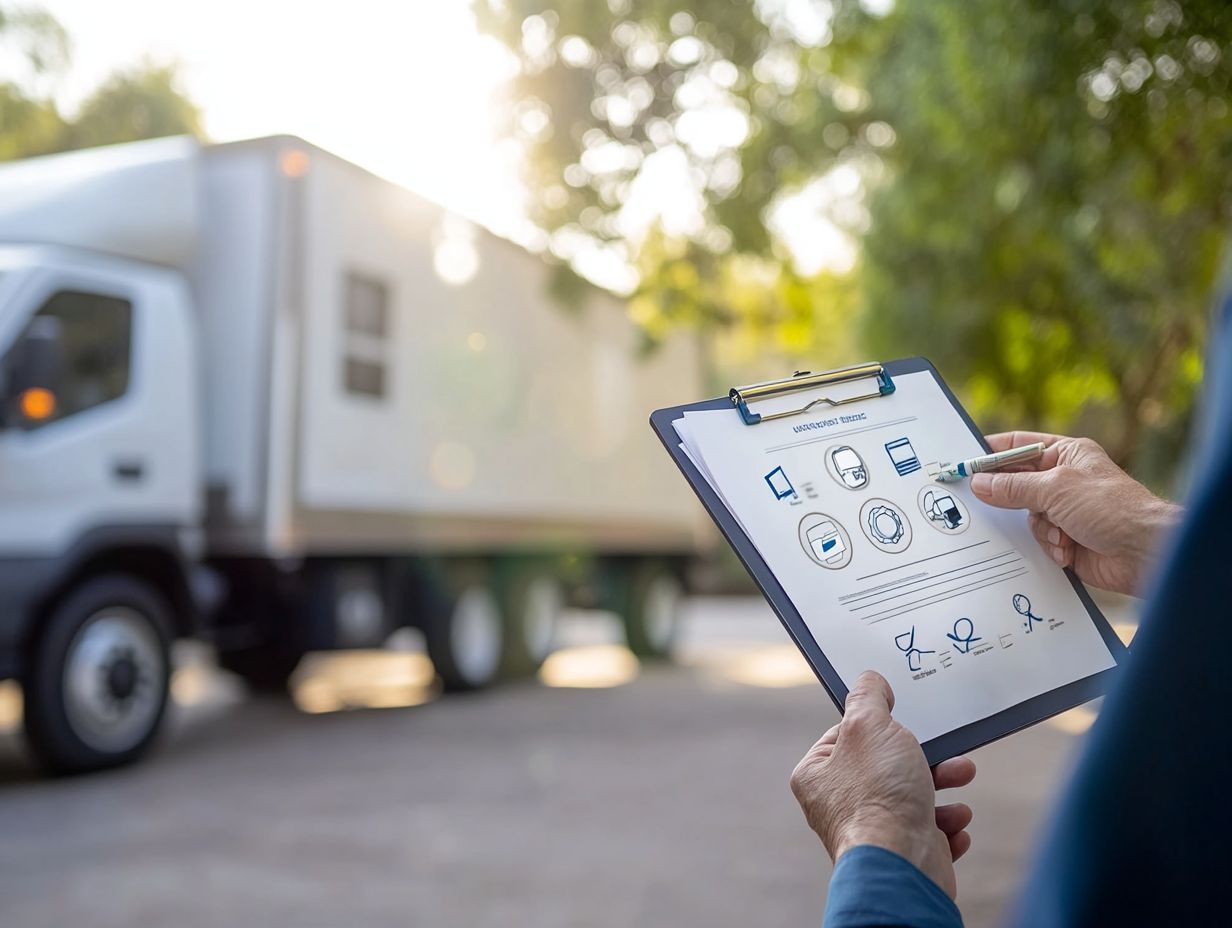What is Coverage for Rental Trucks?
When you embark on your rental truck adventure, understanding your coverage options can truly change the game. Whether you’re moving homes or transporting goods, rental trucks have many uses, but the comfort that comes with proper coverage is invaluable.
Let s dive into the essentials of rental truck coverage. We will explore different types, such as liability and physical damage coverage, while highlighting key factors to consider when selecting the right plan for your needs.
Knowing about the process of obtaining coverage will help you maximize your protection while keeping costs in check.
Jump in now to make your rental experience safe and hassle-free!
Contents
Key Takeaways:

- Understanding rental truck coverage is essential before renting a truck.
- There are various types of coverage for rental trucks, including liability, physical damage, and personal effects coverage.
- Consider factors such as cost, type of truck, and the duration of rental when selecting coverage.
Understanding Rental Truck Coverage
Understanding rental truck coverage is essential for anyone planning a DIY move, whether you choose U-Haul or another rental agency. The coverage options for rental trucks can differ markedly, and having a solid grasp of your insurance policy empowers you to navigate the claims process with confidence, ensuring you re protected against risks during your journey.
Being aware of the insurance premiums and potential exclusions associated with rental truck insurance can shield you from unforeseen expenses, granting you peace of mind as you hit the road.
What is Rental Truck Coverage?
Rental truck coverage encompasses the insurance options available for rental vehicles, specifically designed to protect you against damages and liabilities throughout your rental period, including coverage for utility vehicles.
This coverage is tailored for larger vehicles, which present distinct handling and risk factors compared to standard passenger cars. Unlike conventional auto insurance, which primarily addresses personal vehicles, coverage for temporary rentals considers the unique characteristics of the truck, including its size, weight, and cargo capacity.
For those renting trucks from agencies like U-Haul or Budget Truck Rental, this coverage is vital. It protects you from unforeseen incidents that may arise during transport. Without proper coverage, you could face significant costs for repairs or damages, making it an essential consideration in your rental experience.
Types of Coverage for Rental Trucks
When renting a truck, it is crucial to understand the different coverage options available, as this ensures both financial responsibility and adequate risk protection throughout your move.
Rental truck insurance typically includes liability coverage, which protects you against damages to other vehicles. Additionally, physical damage coverage addresses any damages to the rental truck itself, while personal effects coverage compensates for lost or damaged belongings.
Don t overlook extra coverage options, such as Damage Waivers or collision damage waivers, which can significantly enhance your protection during this important transition.
Liability Coverage
Liability coverage is an essential element of rental truck insurance, protecting you from financial responsibility if an accident occurs or damage arises to another party’s property.
This coverage not only grants you comfort but also ensures that unexpected incidents won t lead to overwhelming financial burdens. If you re considering a rental, it s crucial to understand the specifics of liability coverage particularly the limits typically associated with it since these limits dictate the maximum amount the insurance will pay for damages incurred.
Without sufficient liability coverage, you could face significant out-of-pocket expenses stemming from costly claims or legal fees. Therefore, highlighting the necessity of this coverage is vital for anyone looking to protect their interests and mitigate risks while navigating the road.
Physical Damage Coverage
Physical damage coverage is your safeguard against the costs associated with damage to the rental truck itself. It ensures you aren t left holding the bag for the entire replacement cost if an accident occurs.
This type of coverage becomes particularly crucial when you’re renting a vehicle, as it helps reduce your financial risk during unexpected events like collisions or roadside mishaps.
As you choose your rental truck, you might encounter collision damage waivers agreements that limit what you have to pay if the truck gets damaged that enhance your policy, offering an additional layer of protection. These waivers typically limit your out-of-pocket expenses, allowing you to return the vehicle without the looming fear of substantial repair bills.
The specifics of this coverage can vary significantly. Elements such as rental location, duration, and even your driving history can all influence how much your insurance covers in different situations. Being aware of these details gives you the power to make informed decisions regarding your rental agreement, ensuring you can hit the road with confidence and peace of mind.
Personal Effects Coverage

Personal effects coverage is your safety net for protecting your belongings while they re being transported in the rental truck. It offers compensation for any loss or damage that might occur during your rental period.
Personal effects coverage is important for renters because it provides a sense of calm during the often chaotic moving process. It typically includes protection for a variety of personal items, such as furniture, electronics, and cherished possessions, ensuring that these essentials are secure against unforeseen circumstances.
Unlike standard cargo protection options that may only cover specific items or types of damage, personal effects coverage gives you a more comprehensive safety net tailored to your needs. Understanding which type of coverage best fits your individual requirements is crucial, especially when you’re relocating valuable assets.
Factors to Consider When Choosing Coverage
Choosing the right insurance for your rental truck is crucial let s dive into what you need to consider. It’s essential to consider several key factors. Think about the cost of coverage, the specific type of rental truck you re using, and the duration of your rental period.
Each of these elements can significantly impact your insurance premiums, so taking the time to evaluate them carefully will ensure you make an informed decision.
Cost
The cost of rental truck insurance is shaped by various factors, including the type of coverage you choose, the duration of your rental, and the specific truck you’re renting. This makes it essential for you to evaluate your options with care.
For example, opting for comprehensive coverage often means a higher price tag compared to basic liability options, but it provides superior protection against damages. The length of your rental period is also significant; longer rentals frequently come with discounted rates, while short-term rentals can hit your wallet a bit harder.
Additionally, the specifications of the truck like its size and age will affect your premiums. To effectively estimate your expenses, gather quotes from multiple providers and take into account your unique trip requirements.
By shopping around and inquiring about bundling discounts, you could uncover a more cost-effective solution tailored to your needs.
Type of Rental Truck
The type of rental truck you select can greatly influence your insurance options and coverage requirements. Larger trucks typically demand more comprehensive policies compared to their smaller counterparts.
As you consider the vehicle’s size and weight, it becomes clear that these factors are pivotal in assessing the associated risks and potential liabilities. For example, heavier trucks often require higher coverage limits to safeguard against more substantial damage in the event of an accident.
Insurance providers may perceive larger vehicles as more cumbersome to maneuver, which can lead to increased premiums. Thus, grasping the connection between truck specifications and insurance policies is essential for securing suitable coverage.
This understanding not only affects cost but also dictates the extent of protection available in various scenarios.
Duration of Rental
The duration of your rental can significantly influence both the cost and type of insurance coverage you need. If you’re leaning towards a longer rental, be prepared for potentially more extensive policies compared to short-term options.
For those considering a short-term rental, the insurance choices tend to be quite straightforward. You ll usually find yourself looking at basic liability coverage along with collision damage waivers. If you’re opting for an extended rental, it s crucial to assess your specific needs carefully.
This might mean exploring more comprehensive plans that cover personal belongings and provide higher liability limits, especially if your travels involve additional drivers or unfamiliar areas.
To make the most of your insurance options, consider weighing the benefits of purchasing additional coverage directly from rental agencies against relying on your personal auto insurance policies or credit card protections. This way, you can ensure peace of mind throughout your rental experience.
How to Obtain Rental Truck Coverage
Securing rental truck coverage is an essential step when renting a vehicle. You can obtain this coverage through various avenues, such as the rental agency itself, your insurance provider, or even credit card companies that offer supplemental protection.
It s important to explore all your options to ensure you re adequately protected during your rental experience.
Options for Obtaining Coverage

Excitingly, you have several options to explore when it comes to obtaining rental truck insurance. You can purchase coverage directly from rental truck companies, tap into your existing auto insurance policy, or consider insurance through your credit card company.
Each of these paths offers its own set of advantages and potential drawbacks that can greatly influence both your costs and the level of protection you receive. For instance, rental truck companies might offer coverage tailored specifically for larger vehicles, but be aware that this option often comes with higher premiums.
If you rely on your existing auto insurance policy, you could save some cash. Just make sure to double-check that it extends coverage to rental trucks, as there might be certain things that aren’t covered to watch out for.
Credit card companies can also provide secondary coverage, potentially filling in any gaps, but they usually require that the rental is fully charged to the card. Plus, the benefits can vary based on your specific cardholder plan.
Understanding these nuances is crucial to ensure you have the right protection in place, paving the way for a worry-free rental experience.
Understanding Your Coverage Policy
Grasping the nuances of your coverage policy is essential for effective risk management. It explains what is included, what falls outside the scope, and the specific terms and definitions pertinent to your rental truck insurance.
What is Covered and What is Not
Understanding the ins and outs of your rental truck insurance policy is essential for avoiding unexpected expenses and ensuring you have adequate protection throughout your rental period.
This knowledge gives you the power to make informed decisions about your insurance needs while navigating the often-complex landscape of rental agreements.
Typically, these policies offer coverage for liability in the event of an accident, theft of the vehicle, and damage to the truck itself. However, be mindful of things that aren’t covered that may apply, such as damage resulting from reckless driving, unauthorized drivers, or driving under the influence.
For example, if you decide to take the truck off-road, you might find that the insurance won t cover any damages incurred. Being aware of these limitations can help you safeguard yourself from financial burdens that could arise from mistakes during your rental.
Tips for Maximizing Coverage and Minimizing Costs
You can maximize your rental truck insurance coverage while keeping costs in check by making strategic choices and informed decisions. From selecting the right insurance provider to understanding the discounts and roadside assistance options available to you, each decision plays a crucial role in enhancing your coverage without breaking the bank.
Don t wait understanding your policy now can save you from unexpected costs later!
Precautions to Take During Rental Period
Taking the right precautions during your rental period can significantly reduce risks and ensure that your rental truck insurance remains effective. This underscores the importance of adhering to the guidelines and recommendations from your insurance provider.
Start by conducting a thorough vehicle inspection before you take the keys. Check for any pre-existing damage and ensure that all essential components, like brakes and lights, are functioning properly. Documenting any issues is a crucial step to avoid disputes when returning the vehicle.
Also, make sure you meet all legal requirements, such as possessing a valid driver s license and understanding weight limitations, to further protect yourself against potential liabilities.
It s wise to review your insurance policy and consider any supplementary coverage that could be beneficial based on your specific needs. Take the time to fully understand the terms and conditions outlined by the rental company.
Understanding Coverage Limits and Deductibles
Understanding coverage limits and deductibles is crucial for ensuring you have adequate protection when using a rental truck. These elements significantly shape the financial landscape for renters, particularly when unexpected events arise.
Coverage limits denote the maximum amount your insurance policy will pay for damages. This can greatly impact the financial burden you might encounter.
Conversely, deductibles are the amounts you must cover out-of-pocket before your insurance kicks in. Together, these factors dictate potential claim payouts and influence how much financial responsibility you are prepared to accept.
Being well-informed about these aspects grants you peace of mind, allowing for a safer and more confident rental experience.
Watch this video to learn more about rental truck coverage!
Frequently Asked Questions

What is Coverage for Rental Trucks?
Coverage for rental trucks refers to the insurance or protection offered by the rental company to cover rental vehicles for any damage or liability that may occur while using the truck.
What does coverage for rental trucks typically include?
The coverage provided by rental truck companies typically includes collision damage waiver, liability insurance, and personal accident insurance for the driver and passengers. For more detailed information, you can explore coverage for specialized vehicles.
Do I need coverage for rental trucks if I already have my own car insurance?
In most cases, your personal car insurance will not cover rental trucks. Reach out to your insurance provider today to ensure you’re fully covered!
What is collision damage waiver for rental trucks?
Collision damage waiver (CDW) is a type of coverage that releases you from financial responsibility for any damage to the rental truck in the event of a collision. It is also known as loss damage waiver (LDW) or physical damage waiver (PDW).
Is personal accident insurance necessary for rental trucks?
Personal accident insurance provides coverage for injuries sustained by the driver and passengers in the event of an accident. While it is not required, it is recommended for added protection.
What is liability insurance for rental trucks?
Liability insurance covers any damage or injuries caused by the rental truck to another vehicle or property. It is typically required by law and included in the rental truck coverage.






